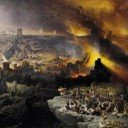Despite being one of the longest chapters in the Apocalypse we will actually be spending a very limited amount of time here in chapter 18. The reason being, for those who have not been here since the beginning of our discussion, is that the focus of the this study is on the eschatological implications of the passages in question. Here we have a repeated discussion of the fall of Babylon, which was discussed previously in more detail.
Also, the emphasis in chapter 18 is on the city’s demise and not about the events surrounding it, which again has been our focus here. There are some key points in helping understanding the identity of Babylon that will be noted.
Rev. 18:1-2 After this I saw another angel coming down from heaven, having great authority, and the earth was made bright with his glory. [2] And he called out with a mighty voice, “Fallen, fallen is Babylon the great! She has become a dwelling place for demons, a haunt for every unclean spirit, a haunt for every unclean bird, a haunt for every unclean and detestable beast.
Since the primary debate amongst preterist is whether Babylon represents Rome or Jerusalem that will be the focus in the discussion of chapter 18. I have become more convinced that Jerusalem is in view as the Covenantal judgments make more sense when levelled against a formerly covenanted nation than against the pagan Roman Empire.
More evidence can be pointed to here in the passage directly above. Note that we are told the city is a dwelling place for demons and had been inhabited by unclean birds and beasts. taking the latter point first it should be noted that only to the Covenantal nation the received the “Law of God” (Israel) could an animal be considered “unclean.”
The pagan nations were not restricted from certain fowl or beasts as a result of them being unclean, so to have their city literally or symbolically inhabited by those beasts would not be seen as a curse. Only Israel would see this as the curse it is meant to represent.
These two curses are also found in Lev 26:22 (wild beasts) and Deut 26:28 (wild birds), the two section dealing with the results of covenantal unfaithfulness.
The former points to an increase in demonic activity and that the city would become a dwelling place for demons. this too is represented in curses for covenantal unfaithfulness found in the Old Testament and amplified by Jesus Himself in Matt 12.
Matt 12:43 “When the unclean spirit has gone out of a person, it passes through waterless places seeking rest, but finds none. 44Then it says, ‘I will return to my house from which I came.’ And when it comes, it finds the house empty, swept, and put in order. 45Then it goes and brings with it seven other spirits more evil than itself, and they enter and dwell there, and the last state of that person is worse than the first. So also will it be with this evil generation.”
Jesus predicted that the first century Jews would be impacted by increased demonic activity. This is pictured also in the judgment of the fifth trumpet where the locust from the pit, lead by Satan himself, attack the inhabitants of Jerusalem.
Rev 18:4 Then I heard another voice from heaven saying, “Come out of her, my people, lest you take part in her sins, lest you share in her plagues; 5for her sins are heaped high as heaven,
Like the warning to escape in the Olivet Discourse here the Lord implores His people to escape while they can. Remember, that even though the Lord is peaking in a past sense regarding the destruction of Babylon (Jerusalem) it hadn’t happened at the time of the writing and so this served as a warning to the inhabitants who belonged to the Lord to leave the city immediately.
The passage goes on to describe through powerfully symbolic and literal language the results of the coming destruction upon the city and the surrounding nations that the city was guilty of fornicating with. The passage concludes with another hint as to the identity being that of Jerusalem.
Rev 18:24 And in her was found the blood of prophets and of saints, and of all who have been slain on earth.”
Though Rome partook in the slaying of many of the Early Church this comment appears much more far reaching as it includes ALL who have been slain on the earth. Only one nation is said to have been guilty of such a crime, and it is in fact, the accusation against Jerusalem Jesus made that lead to the discussion of the destruction of the city and temple in Matthew 23 and 24.
Matt 23:34 Therefore I send you prophets and wise men and scribes, some of whom you will kill and crucify, and some you will flog in your synagogues and persecute from town to town, 35so that on you may come all the righteous blood shed on earth, from the blood of innocent Abel to the blood of Zechariah the son of Barachiah, whom you murdered between the sanctuary and the altar. 36Truly, I say to you, all these things will come upon this generation.
The words of condemnation are nearly identical. This city is guilty of “all the righteous blood shed on the earth” and would pay for that shed blood. It is only directed at one nation in jesus’ words and that nation is represented by the city of Jerusalem.
As we venture next into Chapter 19 we will discuss two major sections. The first is the Marriage Supper of the Lamb and the other the rider on the White Horse and whether this pictures the actual Second Coming or not.





No comments:
Post a Comment